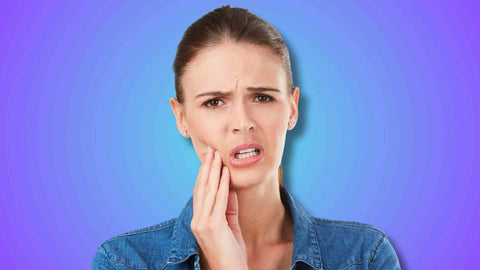Is Toothpaste Bad for You?
No, toothpaste itself is not inherently bad for you. In fact, toothpaste is generally safe and it plays a crucial role in oral hygiene by combating plaque, bacteria, and food particles, thus preventing tooth decay and gum disease.
Additionally, remineralizing toothpaste enriched with remineralizing agents like nano hydroxyapatite can help strengthen your enamel and prevent tooth decay.
Now, while formulations with remineralizing agents like nano hydroxyapatite are beneficial for maintaining strong and healthy teeth, certain ingredients like fluoride or sodium lauryl sulfate may cause concerns for some.
Therefore, while some people suggest that toothpaste is bad for us, that's not necessarily true; we just have to make health-conscious decisions and educate ourselves on the safest toothpaste to use.
In this article, I'll explain everything you need to know about whether toothpaste is bad for you and how to choose the safest one.
Why do we need toothpaste?

We need toothpaste for several different important functions in maintaining our oral health. First, toothpaste helps to remove food particles, bacteria, and plaque from our teeth and gums when we brush.
This mechanical action of brushing combined with the abrasive particles in toothpaste physically scrubs away debris and bacteria which can prevent tooth decay and gum disease.
Additionally, remineralizing toothpaste with sodium fluoride or nano hydroxyapatite, a mineral that strengthens tooth enamel, can stimulate remineralization and reverse tooth decay. Essentially, nano hydroxyapatite makes our teeth more resistant to acid attacks from the bad bacteria living in our mouth, thus reducing our risk of enamel erosion.
Moreover, toothpaste may contain ingredients that freshen breath, such as mint or menthol, leaving your mouth feeling clean and refreshed after brushing.
Overall, toothpaste plays a crucial role in maintaining dental health and preventing dental problems, and it's an easy practice to implement.
Why might toothpaste be bad for us?

While toothpaste is crucial for maintaining our oral health, it's essential to be aware of potential drawbacks associated with certain formulations. Whitening toothpaste, for example, can be abrasive and might not be suitable for everyone, particularly pregnant women and kids.
Further, commonly avoided ingredients like fluoride and sodium lauryl sulfate found in many toothpaste varieties have been linked to side effects like dental fluorosis and canker sores, so it's important to choose products that work well for your specific needs.
Additionally, artificial flavors, dyes, and preservatives commonly found in toothpaste may not agree with everyone's sensitivities, particularly those of us with sensitive teeth, and could lead to adverse reactions.
Lastly, the environmental impact of toothpaste tubes is a concern due to the plastic waste they generate, so we recommend considering eco-friendly toothpaste alternatives if possible.
What to Avoid in Toothpaste

Of all of the controversial toothpaste ingredients out there, fluoride, triclosan, charcoal, and artificial dyes are some of the most common offenders.
By and large, these ingredients are controversial for their potential to induce toxicity or irritation to the sensitive tissues in your mouth. Thankfully, we have other safe ingredients that can replace this list, including nano hydroxyapatite which is a safe and effective alternative to fluoride.
Now, let's walk through what to avoid in toothpaste.
Sodium Lauryl Sulfate (SLS)

Ever wondered why your toothpaste foams? Well, SLS is a surfactant commonly used in personal care products, including toothpaste, to create foam and aid in the distribution of ingredients.
However, SLS can also strip away the protective layer of saliva on the gums, leading to dryness, irritation, and gum inflammation. Additionally, some individuals may experience allergic reactions or increased sensitivity to SLS, manifesting as mouth ulcers, canker sores, or a burning sensation in the mouth.
Because of its track record of affecting otherwise healthy gums and causing canker sores, some people consider sodium lauryl sulfate one of the more harmful chemicals in toothpaste.
For those with sensitive gums or a history of oral sensitivity, avoiding toothpaste containing SLS can help minimize discomfort and maintain oral health without exacerbating existing issues.
Fluoride Toothpaste

While sodium and stannous fluoride are commonly used in toothpaste for their ability to prevent tooth decay and strengthen enamel during tooth brushing, you may prefer fluoride-free alternatives due to concerns regarding potential adverse effects associated with fluoride exposure, such as dental fluorosis.
For example, those with fluoride sensitivities or allergies may experience discomfort or irritation when using fluoride-containing toothpaste.
Additionally, excessive fluoride intake, particularly in young children who may swallow toothpaste, can increase the risk of dental fluorosis, a condition characterized by white or brown discoloration of formerly healthy teeth.
To mitigate these risks, parents and pregnant women may opt for fluoride-free toothpaste formulations to maintain good oral health without the potential drawbacks associated with fluoride exposure.
Further, hydroxyapatite toothpaste is considered the best alternative to fluoride toothpaste.
Triclosan
You might want to avoid triclosan in toothpaste due to concerns about its potential negative effects on both oral and overall health. Among some of the most controversial toxic toothpaste ingredients, triclosan is an antimicrobial agent commonly used in personal care products, including toothpaste, to prevent bacterial growth and maintain oral hygiene.
However, several studies have raised concerns about the safety of triclosan, including its potential contribution to antibiotic resistance and disruption of the body's hormonal balance.
Additionally, the American Dental Association (ADA)has stated that there is insufficient evidence to support the long-term safety and effectiveness of triclosan in toothpaste, leading to some skepticism regarding its use in oral care products.
Hydrogen Peroxide

While hydrogen peroxide is safe to use every once in while through whitening strips, you might want to rethink using whitening toothpaste with hydrogen peroxide due to its potential to cause oral irritation and tooth sensitivity.
Hydrogen peroxide is commonly used in toothpaste for its whitening properties, as it can help remove surface stains and brighten teeth. However, hydrogen peroxide can also be harsh on the gums and oral tissues, leading to irritation, inflammation, and increased tooth sensitivity with prolonged use or at high concentrations.
Some individuals may experience discomfort or even allergic reactions when using toothpaste containing hydrogen peroxide, making it advisable to avoid such products if you have sensitive gums or a history of oral sensitivity.
Furthermore, long-term use of hydrogen peroxide can disrupt the balance of bacteria in the mouth, potentially leading to oral health issues such as gum disease or oral infections.
Charcoal

Did you know charcoal is an abrasive ingredient with the potential to damage tooth enamel and negatively affect your dental health?
Charcoal toothpaste contains finely ground particles of activated charcoal, which can be abrasive and harsh on tooth enamel when used regularly over time. One cause of tooth decay, continuous use of charcoal toothpaste may lead to enamel erosion, causing increased tooth sensitivity and making your teeth more susceptible to damage.
While some people suggest that activated charcoal can absorb toxic chemicals and stains, its abrasive nature may outweigh its benefits in the long run, especially if you have sensitive teeth or already weakened enamel.
Good Ingredients to Look For in Toothpaste

When considering toothpaste ingredients, it's helpful to look for the following categories:
- Remineralizing Agents: Ingredients hydroxyapatite or nano hydroxyapatite can aid in remineralizing weakened enamel, repairing microscopic imperfections, and strengthening teeth against decay.
- Abrasive Ingredients: Mild abrasives like hydrated silica, calcium carbonate, or baking soda can assist in removing surface stains and plaque buildup without damaging the enamel.
- Antimicrobial Agents: Compounds such as zinc citrate can help inhibit the growth of harmful bacteria in the mouth, reducing plaque formation and the risk of gum irritation.
Thankfully, you can find all of these great ingredients in our toothpaste tablets which are effective and convenient.
Let's explore some of these key ingredients.
Nano Hydroxyapatite
Nano hydroxyapatite (nHA) is a derivative of hydroxyapatite, a naturally occurring mineral that constitutes the main inorganic component of human teeth and bones.
Nano hydroxyapatite is frequently used as a remineralizing agent in zero fluoride toothpaste. When tooth enamel becomes demineralized due to acid erosion from plaque acids or dietary acids, nano hydroxyapatite can help restore minerals like calcium and phosphate to the enamel surface, effectively remineralizing and strengthening the teeth.
Additionally, nano hydroxyapatite can form a protective layer over the enamel, shielding it from further acid attacks and reversing tooth decay. In comparing nano hydroxyapatite vs hydroxyapatite, nano hydroxyapatite toothpastes tend to be more effective at remineralization and teeth whitening due to the smaller particle size.
It offers a natural alternative to fluoride toothpaste while providing similar benefits in terms of enamel remineralization and cavity prevention. Its biocompatible nature and minimal side effects make it a popular choice among those with sensitivities to fluoride or those looking for safer alternatives in oral care.
Xylitol

Xylitol, a sugar alcohol derived from natural sources like fruits and vegetables, is a near-magical ingredient in oral care. Renowned for its cavity-fighting properties, xylitol effectively disrupts the growth of harmful bacteria, particularly Streptococcus mutans, responsible for dental plaque formation and decay. By impeding bacterial growth, xylitol helps stop the progression of cavities and promotes overall oral health.
Moreover, xylitol facilitates the remineralization process by enhancing the absorption of essential minerals like calcium and phosphate into tooth enamel. This fortifies the enamel structure, making teeth more resilient to acid attacks and enamel erosion, thus reducing the likelihood of cavities.
In addition to its anti-cavity prowess, xylitol toothpaste plays a pivotal role in maintaining a balanced oral environment by curbing acid production and stimulating saliva flow. Its natural sweet taste not only enhances the palatability of toothpaste but also encourages saliva secretion upon consumption.
Consequently, xylitol's multifaceted dental benefits make it a perfect ingredient in your everyday toothpaste.
Zinc Citrate

Zinc citrate is a compound commonly included in toothpaste due to its various dental health benefits. One primary function of zinc citrate is its ability to inhibit the formation of dental plaque, which is a sticky biofilm comprised of bacteria that can lead to gum disease and tooth decay.
By hindering the adhesion of bacteria to the tooth surface, zinc citrate helps prevent the buildup of plaque, reducing the risk of oral health issues. Additionally, zinc citrate possesses anti-inflammatory properties that can help soothe gum irritation and promote gum health, contributing to overall oral well-being.
Furthermore, zinc citrate is often included in toothpaste formulations for its odor-neutralizing effects. It can help combat bad breath by targeting the sulfur compounds produced by oral bacteria, which are often responsible for malodor.
Sodium Bicarbonate

Sodium bicarbonate, commonly known as baking soda, is used toothpaste for its multi-functional properties, One of its primary functions is its abrasive properties, which help remove surface stains and plaque buildup from the teeth. Its mild abrasiveness aids in polishing the enamel without causing excessive damage, unlike stronger abrasives like charcoal.
Additionally, sodium bicarbonate acts as a natural deodorizer, effectively neutralizing odors and freshening breath by combating the volatile sulfur compounds produced by oral bacteria. This dual action of cleansing and deodorizing contributes to improved oral hygiene and a fresher mouth.
Further, sodium bicarbonate possesses alkaline properties that help balance the pH level in the mouth. Maintaining a balanced pH is crucial for dental health as acidic conditions can contribute to enamel erosion and tooth decay.
By neutralizing acids and promoting a more alkaline environment, sodium bicarbonate helps protect the teeth from acid-related damage and supports remineralization, the process by which lost minerals are restored to the enamel.
Is fluoride free toothpaste good for you?

Yes, fluoride free toothpaste can be a great option for you, especially if you prefer to steer clear of fluoride or have specific sensitivities. However, it's essential to choose a toothpaste that contains alternative remineralizing agents like nano hydroxyapatite.
Nano hydroxyapatite has been proven to strengthen tooth enamel and promote remineralization effectively, potentially offering superior benefits compared to standard hydroxyapatite. By opting for fluoride free toothpaste with nano hydroxyapatite, you can still maintain excellent oral health while addressing your individual preferences and needs.
Summary: Is toothpaste bad?

No, toothpaste itself is not inherently bad; in fact, it plays a crucial role in maintaining our oral health by removing plaque, bacteria, and food particles from our teeth and gums when we brush.
However, certain formulations or ingredients in toothpaste may have drawbacks or side effects for some individuals. For example, abrasive whitening toothpastes or those containing fluoride may not be suitable for everyone, especially pregnant women or individuals with specific sensitivities.
Additionally, toothpaste tubes contribute to plastic waste, posing environmental concerns.
For these reasons, many individuals are switching to sustainable toothpaste with nano hydroxyapatite instead of fluoride to support their health and protect the environment.
Frequently Asked Questions
Is it better to not use toothpaste?
No, it's not better to skip using toothpaste. Toothpaste plays a crucial role in oral hygiene by removing plaque, bacteria, and food particles from teeth and gums. It also contains important ingredients like nano hydroxyapatite that help prevent tooth decay and cavities. Brushing with toothpaste is essential for maintaining optimal oral health.
Can toothpaste be unhealthy?
Yes, toothpaste can potentially be unhealthy if certain ingredients are used excessively or if the toothpaste is ingested in large amounts. Some toothpaste may contain ingredients like fluoride or abrasive agents that can cause harm if consumed in large quantities. Additionally, some individuals may be sensitive or allergic to certain ingredients in toothpaste, leading to adverse reactions. However, when used properly and as directed, toothpaste is generally safe for oral hygiene. It's essential to choose toothpaste wisely and follow recommended usage guidelines to minimize any potential health risks.
Do dentists actually recommend toothpaste?
Yes, dentists do recommend toothpaste as part of a regular oral hygiene routine. However, it's important to note that not all toothpaste is created equal. Dentists increasingly advocate for the use of nano hydroxyapatite toothpaste over fluoride-based alternatives. Unlike fluoride, which may carry potential risks such as toxicity if ingested and sensitivity in some individuals, nano hydroxyapatite toothpaste offers effective cleaning and remineralization without adverse effects. Therefore, dentists often recommend nHA toothpaste as a safer and more beneficial option, particularly for children, pregnant women, and those with sensitivities to fluoride.
What is the safest toothpaste to use?
The safest toothpaste to use is NOBS Toothpaste Tablets. These tablets are designed to provide effective cleaning and protection for your teeth while minimizing potential risks associated with traditional toothpaste. NOBS Toothpaste Tablets are formulated with nano hydroxyapatite, a safe and natural ingredients while also free from harsh chemicals and artificial additives. Therefore, we offer a convenient and eco-friendly alternative to traditional toothpaste tubes while being safe for everyone's use.
What is the healthiest toothpaste to use?
The healthiest toothpaste to use is one formulated with nano hydroxyapatite. Nano hydroxyapatite is a naturally occurring mineral that helps to remineralize tooth enamel, making it stronger and more resistant to decay. It provides similar protective benefits to fluoride but without the associated risks. Toothpaste containing nano hydroxyapatite is considered safe and effective for maintaining optimal oral health. Therefore, choosing a toothpaste with nano hydroxyapatite can be a beneficial option for promoting healthy teeth and gums.
Which toothpaste is least harmful?
The toothpaste with nano hydroxyapatite is considered the least harmful to use. Nano hydroxyapatite is a naturally occurring mineral that helps to remineralize tooth enamel, making it stronger and more resistant to decay. Toothpaste containing nano hydroxyapatite provides effective cleaning and protection without the potential risks associated with harsh abrasives or artificial additives. Therefore, choosing toothpaste with nano hydroxyapatite can be a safe and beneficial option for maintaining optimal oral health with minimal harm.
What is unhealthy about fluoride?
Fluoride is generally safe and beneficial for dental health when used appropriately. However, excessive ingestion of fluoride, especially during early childhood when teeth are developing, can lead to a condition called fluorosis. Fluorosis can cause discoloration or mottling of the teeth, particularly in children under the age of 8 whose permanent teeth are still forming. Ingesting large amounts of fluoride over time can also lead to other health issues such as skeletal fluorosis, which affects bones and joints. Therefore, it's important to use fluoride-containing products like toothpaste and mouthwash as directed and to supervise young children to prevent swallowing excessive amounts






















